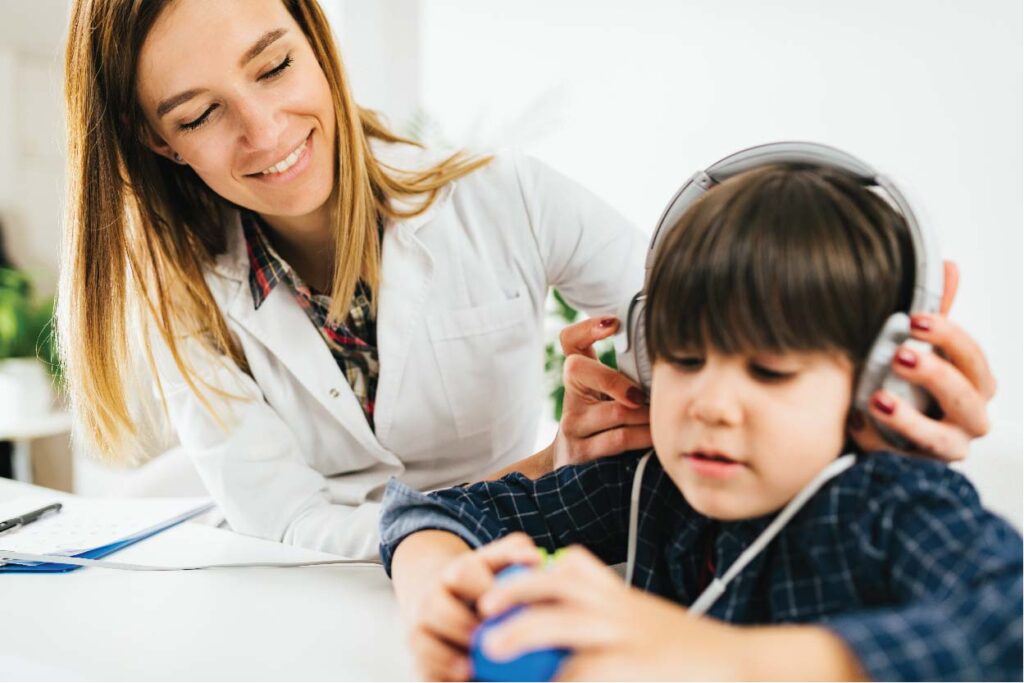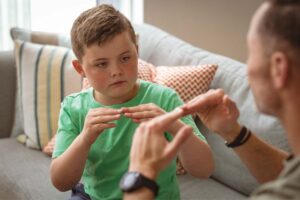Early Signs of Hearing Loss in Children

It’s not always obvious when a child is experiencing hearing loss. Often, young children cope with these issues quite well and continue reaching developmental milestones despite their hearing challenges.
But limited hearing takes a toll on the child’s ability to learn and focus. Whether it is temporary hearing loss or a permanent condition, it’s essential for parents to identify the early signs so the child can get help when needed.
Remember: children often can’t communicate sufficiently to describe what they are experiencing. Also, they might feel like hearing loss is “normal” because they don’t know anything different.
Watch for These Possible Signs of Hearing Loss
Signs of hearing loss vary depending on the child’s age and developmental level. Here are common signs of hearing loss in a young infant or toddler:
- No reaction to loud sounds in the environment
- The baby pulls at their ears often
- Doesn’t turn their head to seek out where sounds are coming from
- The child stops making experimental sounds with their mouth
- You can hear babbling, but it doesn’t turn into words or understandable speech
- There is an obvious malformation of the ears at birth
- The infant doesn’t respond to voices
- Delayed communication and speech development
A young infant might cope with mild or moderate hearing loss, but you can start noticing new signs of hearing loss when the child reaches school age. Watch for these common signs that your school-age child could be having hearing issues:
- Unable to understand or follow simple directions, such as “put the toy in the box” or “get your shoes”
- Exhaustion and fatigue at the end of the school day because of increasing concentration to understand communication
- An increase in social difficulties or behavioral problems
- Difficulty keeping up with school
- Grades are going down
- Can’t understand what you are saying without looking at your face directly
- Changes in behavior, such as withdrawing from activities they usually enjoy
- Frequent communication breakdowns and frustration
- Starting to fall behind in communication and speech skills
- Doesn’t know where sounds are coming from
- Increased difficulty with communication when there is background noise
- Not responding when called
- Mispronouncing words
- Wanting to turn up the TV or music louder than what is comfortable for other family members
Tips for Parents: What to Do If You Suspect Hearing Loss
Have you noticed any of the above signs of hearing loss in your child? Then it’s possible that they might be experiencing either temporary or permanent issues. The best thing you can do is schedule a hearing test with an industry expert.
An audiologist is a great resource to confirm whether your child has a hearing problem. Through this process, we can measure the child’s hearing abilities, determine a diagnosis, then create a customized plan to optimize the child’s hearing as much as possible. Rest assured knowing that there are options for managing hearing loss, helping your child enjoy a thriving life.
Remember: hearing is critical for learning and development. If the child can’t hear the teacher, then it will negatively impact their performance in school. If they can’t hear their friends or family, then the challenges can take a toll on social interactions and relationships.
Routine Screening to Monitor for Childhood Hearing Loss
Most schools have routine screenings to look for signs of hearing loss in their students. These screenings could be an early indicator that something is going on. But the screenings don’t provide full information about the severity of hearing loss and how it is impacting the child’s life.
Instead of relying on school screenings, a better solution is to schedule a consultation with a local audiologist. You can book an appointment if you suspect the child is experiencing hearing problems. Many parents also like to have a routine examination. New babies should have a hearing screening by the age of 1 month, and this screening often happens when they are in the hospital.
For young children, it’s a good idea to check their hearing when they reach the age to go to school. Regardless of the child’s age, if they don’t pass the hearing screening, then you should schedule a full hearing test without delay.
Treatment Options for Children with Hearing Loss
When your child meets with an audiologist, the first priority is to determine the child’s hearing capabilities and underlying causes of hearing loss. Sometimes, the treatment might be as simple as cleaning out excess earwax to open the ears up. Temporary hearing loss can occur when the child has an ear infection or other health issues.
If the hearing loss is caused by a genetic condition, injury, or other irreversible cause, then the priority is to maximize the child’s ability to communicate by using other treatments. Options include:
- Learning ways to communicate through lip reading or sign language
- Using technology to amplify hearing, such as hearing aids or cochlear implants
- Assistive devices such as alerting devices that use lights or louder sounds for the phone, alarm clock, or doorbell
- Augmentative and alternative communication (AAC) devices such as closed captioning or a computer program to change speech into text
- Surgery or medication to correct certain types of hearing loss
- Services to support the family
Ongoing Support for the Child and Family
Once a diagnosis is established, it’s important to maintain ongoing communication with your audiologist. For example, the child might need adjustments to improve hearing aid settings, as well as new technology and fittings as the child grows.
It’s normal to feel anxious and worried about childhood hearing loss. Rest assured that there are management adaptations possible to help the child at home and in school. An audiologist offers the ongoing support you need to minimize developmental delays and other common issues that can affect the child’s education and social interactions.
Do you need to schedule a hearing test for your child? Then our team is here to help. You are invited to contact our office for more information about available services. Fairfax Hearing Center is one of the leading providers in the area, offering full-service hearing solutions for patients of all ages.

